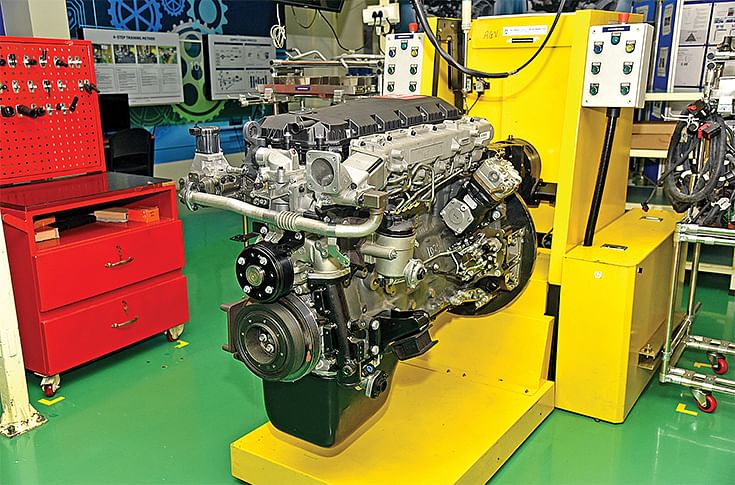VECV’s Rajinder Singh Sachdeva: ‘Things will start looking up in Q2 FY2021 after the uncertainty on BS VI’
Rajinder Singh Sachdeva, chief operating officer, VECV explains its recovery strategy with increased investments and production capacity of its commercial vehicle portfolio
A recovery in the commercial vehicle industry could well be on its way as per VECV’s chief operating officer Rajinder Singh Sachdeva. He tells Autocar Professional that they are ramping up capacity in anticipation.
Some domestic OEMs expect to see CV sales reaching earlier peak levels only in another five years. Do you agree with BS VI norms kicking in from April 2020, the CV segment will take a long time to recover?
We are more optimistic than everyone else and that's the reason we have invested a lot in our technology and also increased our capacity to 130,000 units from the current 90,000 units.
We are also starting our Bhopal plant with 40,000 units additional capacity. If you look at the slowdown, it's not a cyclical but a systemic one. The industry has been impacted because of various reasons, starting with the revised axle-load norms. Due to that, the capacity of the current fleet went up in the system by almost 15-20 percent. Secondly, the liquidity crisis caused by the NBFC problem. Otherwise, latent demand remains very good in the CV industry.
If we see the infrastructure spend from the government’s side, there is a lot of focus on the importance of investment in the infrastructure. From that angle, the systemic issues will be taken care of in another four or five months. I strongly feel that the market will try to return to its earlier peaks in the next two to three years.
Also, because the BS IV inventory is being reduced across the complete sales channel, OEMs are not producing vehicles but are selling those which are already in stock. That means the industry is producing less and as a result in some places and, with us also, the retail sales are higher than wholesales.
We estimate that once the uncertainty goes after BS VI from April 1, 2020, the impact of the excess capacity will also be neutralised. Because we have sold fewer vehicles, it means we have almost neutralised whatever surplus capacity was there.
The government too could offer other benefits. I expect that after BS VI, maybe in the first or the second quarter of FY2021, things will start looking up tremendously.
With your BS VI engine development programme, has the Volvo Group also gained access to Indian suppliers for its global operations?
Definitely. Volvo is also very keenly looking at our (Eicher) technology development. Looking at the cost level of what we have achieved, Volvo is looking at how it can adapt some of these technologies in its engines.
Yes, the Swedish truckmaker is very keen, both in terms of our engine supplier base as well as the Indian technology development approach and frugal engineering. We are looking into all these areas and how the Volvo Group can benefit from that.
One of the advantages VECV has over its competition is that you make your own bus body. How is this business set to grow?
As in heavy-duty trucks, where our market share is above 5 percent, we have a similar share in buses too. The heavy-duty bus segment is a very good opportunity for us. We are faring very well in school buses and have a 50 percent market share with premium buses like the Proline series, Starline buses and Skyline series. For now, heavy duty is one area where our market share is the least and we are upgrading our products. We have also launched a new vehicle, which is built on a 12-metre platform, one where we have a strong opportunity and there's potential for us to make inroads into the HD bus segment. That’s our plan for the future.
In which other areas is VECV looking to expand?
At the front end, we are talking about dealer expansion and retail excellence which involves network growth, competency building and making them BS VI-ready. Wherever we see an investment opportunity, we will not hesitate.
Finally, when will the Bhopal plant begin operations?
Trial production has begun and from April 2020, commercial operations will start. The two- and three-litre BS VI engines are being manufactured there, and the Pro 2000 series of light-duty trucks will also roll out from the Bhopal plant.
(This interview was first published in the December 15, 2019 Anniversary issue of Autocar Professional)
RELATED ARTICLES
INTERVIEW: "EV Demand is Rebounding both in India and Around the Globe" - JLR's Rajan Amba
Jaguar Land Rover India MD Rajan Amba discusses the India–UK FTA, the company’s manufacturing plans, the upcoming Panapa...
TVS Celebrates 20 Years of Apache, Eyes Premium and Global Push
Marking two decades of its flagship performance brand, TVS Motor unveiled special anniversary editions on Saturday while...
Q&A: Mahindra's Nalinikanth Gollagunta on Upcoming Festive Season, 'Bold' Design Choices
Automotive Division CEO Nalinikanth Gollagunta says mid-teens growth is achievable with Roxx ramp-up, BEVs, and a resil...






 15 Jan 2020
15 Jan 2020
 16901 Views
16901 Views






 Prerna Lidhoo
Prerna Lidhoo


 Darshan Nakhwa
Darshan Nakhwa


